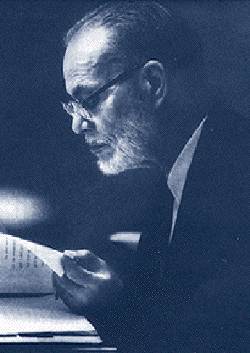 By Yasser Latif Hamdani
By Yasser Latif Hamdani
Last week (February 6) marked the 114th Birthday of one of Pakistan’s greatest unsung heroes. Once again, there was no mention of commemoration of his remarkable like. No sense of gratitude from a nation for which he did so much. He has been wiped out of our memory because he was an Ahmadi, despite his glorious contributions to Pakistan and its cause (see related post on Dr. Abdul Salam).
Sir Zafrullah Khan’s services rendered to Muslims of India, Pakistan and the Third World are second only to that of Quaid-e-Azam Mahomed Ali Jinnah. As a jurist, a diplomat and a patriot he stood head and shoulders above the lesser men who have made a mockery of our republic.
Born in 1893 in Sialkot in what was to become one of the earliest Ahmaddiya households, this small town boy rose to be one of the shrewdest legal minds of his time. His early education was in Sialkot, after which he proceeded to Lahore for his bachelors degree, under the tutelage of none other than the great Iqbal himself. He got his law degree from King’s College London in 1914, where he stood top of his class and was the first person from the Indian subcontinent to do so. He was, like most great figures of that time, called to bar at Lincoln’s Inn.
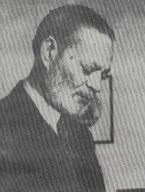
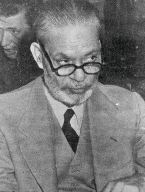
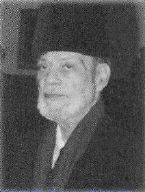


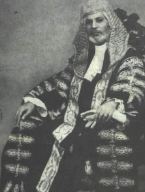
As a practicing lawyer, he soon proved his mettle and had many reported cases to his name. The first major politician to recognize Zafrullah’s talents was Sir Fazli Hussain, the founder of Unionist Party of Punjab. Starting his career in his early 30s as a member of the Punjab legislative Council, he rose to prominence as an indefatigable crusader for Muslims of Punjab. Later he represented the Muslims at round table conference and crossed swords with figures like Jinnah and Gandhi. In 1931, he became the Muslim League president and at the roundtable conference, he cornered no less a person than Churchill in a committee hearing who was forced to accept Zafrullah’s point of view.
Later he was offered a seat on Viceroy’s permanent Council, which he took to further his cause. He also served at varying times as the minister of Railways, Public works, labour and law under the Viceroy. For a brief period, he also became British India’s representative to the League of Nations, just before it was dissolved.
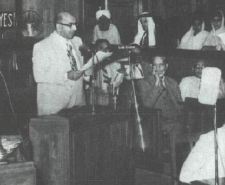
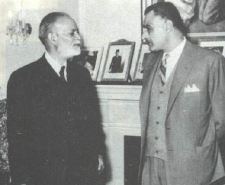
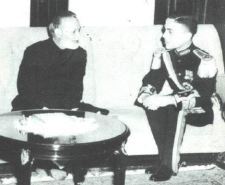
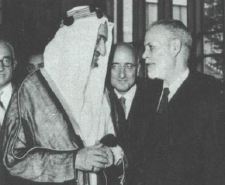
![]()
However his greatest contribution came when he drafted the famous Lahore Resolution, which till this day is the rallying point of Pakistan and Pakistani nationalism. He had been tasked with finding a common point between the popular demand for “Pakistan” and Muslim League’s all India requirements. The Lahore resolution was a broad based solution which left the door virtually open for several solutions and negotiation on the issue of partition. In essence it envisaged 2 or 3 great republics for the Muslim peoples and it was this document which forms the basis not just of Pakistan but also of Bangladesh. For this he got a lot of slack. No less a person than Khan Abdul Wali Khan highlighted Zafrullah’s religious belief to play on the popular conspiracy theory that holds Ahmadis to be British touts.
Later from 1942 onwards, he served as a federal judge (equivalent of an Supreme court C judge) of India and finally took leave on the eve of Pakistan to serve the cause of Pakistan before the Radcliffe Commission, on Jinnah’s personal request. On 25th December 1947, Jinnah appointed him the Foreign Minister of Pakistan. At the UN, Sir Zafrullah emerged as the most eloquent advocate of all third world and Islamic issues. It was Zafrullah whose efforts materialized into the UN Resolutions on Kashmir, which are the basis of the Pakistani case and grievance. Later he became the first Asian president of the International Court of Justice, a singular and unique honor for any Pakistani. He also served, briefly, as the President of the UN General Assembly. He passed away in September of 1983 in Lahore.
A prolific author on the history of Pakistan and Islam, his most famous book was titled “Agony of Pakistan” in which he makes plain the great betrayal which wrested the country from the hands of its patriots into the hands of those who were its greatest enemies. Ironically, today Jinnah’s most trusted lieutenant is not even remembered by the state which owes him so much, including its own founding document. It is the memory of people like Zafrullah Khan that will keep alive the original idea of Pakistan and there is no doubt that one day the posterity will reclaim its true destiny as a progressive and modern republic.
Yasser Latif Hamdani is a lawyer in Lahore and a researcher of the history of the Pakistan Movement.




















































From Vali Khan’s book; http://www.anp.org.pk/factsAreSacredchapter5.htm
[quote]
Writes the Viceroy:
“I may do what I like it, including sending a copy to you; thirdly, the copies have been passed to Jinnah and I think to Hydari (Sir Akbar Hydari, then Prime Minister of the Nizam of Hyderabad), and, fourthly, while he, Zafrullah, cannot of course admit its authorship, his document has been prepared for adoption by the Muslim League with a view to be given the fullest publicity.”
The Viceroy explains that although the scheme had been drawn up at his instance, since Zafrullah was Qadiani, the Muslims’ knowing that it was his handiwork would make it suspect in their eyes from the very start. Consider the dates. This letter was written on April 12, 1940. The plan had been sent earlier. A copy of it had also gone to Mr. Jinnah, and also to Sir Hydari (for the financing of it). Obviously it was much the same scheme that was adopted as the Pakistan Resolution just at that time, on March 23, 1940.
[/quote]
this article is filled with hyperbole and makes a completely untenable claim that zafarullah khan made greater contribution to pakistan movement than liaquat ali khan did. jinnah himself appointed liaquat to two key positions which were higher than any position held by zafarullah khan. before independence, liaquat was chosen by jinnah as the secretary general of muslim league and after independence, jinnah appointed liaquat as the first prime miniter of pakistan. moreover zafarullah khan did not have the sort of standing in the awam that liaquat did.
also zafarullah khan’s sectarian background has nothing to do with contribution of ahmedis to the pakistan movement. leaders at the forefront of the movement were not acting on behalf of sectarian groups and even today leaders are supported based on their perceived contribution to pakistan rather on the basis of sectarian identification. people trying to spread sectarian or for that matter ethnic hatred are playing a very dangerous game and are deserving of complete contempt.
MU that is Begum Maulana Muhammad Ali…
Moiz, there is plenty of information available on the internet both for- and against, just search on the appropriate words. Danger of starting this on this forum is that instead of looking at everything from the point of view of benefit for Pakistan and its people (of course remaining fair to everyone at the same time) we will be dragged into sectarian discussions…ATP is doing a great job at trying to remain focused on Pakistaniat, I would hate to loose that. :)
On a slightly separate note, in the header picture, I was told that the woman in burqa was also an Ahmadi. Can someone please confirm or deny that? Thanks.